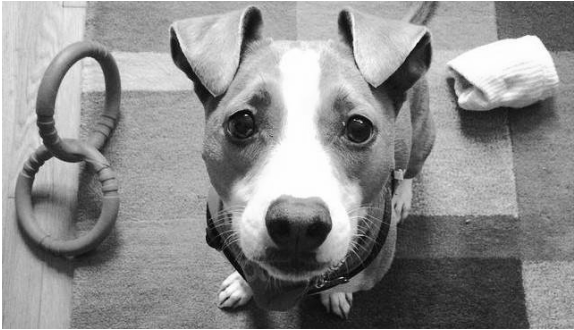|
A year ago, I got my first dog (a pit bull-chihuahua mix, if you can believe it). Nacho has since been my partner in crime through many career coaching calls and client meetings. As I began to observe Nacho’s behavior early on, I couldn’t help but draw several parallels between his canine conduct and a successful job search.
1. Develop a routine. For starters, Nacho begins each day with a pronounced stretch right before his long morning walk. Then there’s a lot of sleeping, eating, and staring out the window. Looking for a job can be mentally and physically draining, and having a routine that includes stretching and exercise gets you ready for the day’s challenges. Because the job search can take months, a routine helps you stave off the job search blues and keeps you focused for the long haul. Here’s a sample weekly routine some of my clients follow: Monday: bookmark new job postings, Tuesday: tweak resumes and cover letters, Wednesday: submit applications, Thursday: network online and off, Friday: follow up, write blog posts, and reflect on the week’s progress. You don’t have to follow this example, just find a rhythm that works for you and stick to it. If you experience a job rejection or a mental rut, you’ll have a familiar routine to fall back on. 2. Sniff out the competition. Nacho respectfully sniffs out other dogs he meets, whether they’re tiny teacup Yorkies or labs five times his size. In the job search, carve out ample time to research the industries and companies you’re targeting. Whenever possible, scope out your direct competition, that is, the other job candidates vying for similar jobs. What soft and technical skills do they have that you may be lacking? What can you learn from the successful candidates--and from the miserable ones? Conducting this “research” involves nothing more than heading to your local bar and, drink in hand, observing and talking to people. Of course, plenty of folks share their job search stories online. Take other people’s narratives with a healthy grain of salt, but don’t ignore them. You may be surprised by how much you learn. 3. Learn to follow basic instructions. When Nacho is told to sit, he sits. When he’s asked to raise his paw, he does just that. Similarly, when a job application specifically asks for a Word .doc version of your resume, make sure to attach it, even if you’re a staunch proponent of PDFs. After all, the recruiter (or the applicant tracking system software) might dismiss your application just because you’ve failed to follow basic instructions. Likewise, if you’re told that your interview begins at 1pm, don’t show up at 12:30. Your overzealousness won’t be misconstrued as insubordination, but it will inconvenience the interviewer’s schedule, or at least make you restless from all that idle waiting. At the most, show up 5-10 minutes early, unless the recruiter suggested otherwise. 4. Brush up on relevant skills. Nacho loves exploring new ground, literally. His tail wags passionately when he encounters foreign objects and strangers. There’s an elementary school across the street, and each night as Nacho walks by it, he gets wildly excited. Maybe he’s thinking about night school? To remain marketable in the ever-changing job landscape, you need to keep your knowledge and skills sharp. This is true of every industry, but especially highly-evolving ones like IT, biotech, media and marketing. Whether this means going back to school or casually exploring the smorgasbord of online resources, never stop learning. At worst, you’ll discover something new or realize you don’t want to follow a certain career path. At best, you’ll leverage your newfound skill set to land your next job. 5. Sleep like a dog. Snoozing is possibly Nacho’s favorite activity, next to having his belly rubbed. I could pull any sampling of random statistics touting the benefits of sleep (including Arianna Huffington’s The Sleep Revolution), but I’ll just take a page from what I observe directly: sleep-deprived employees are not functioning at their best. Even the passionate workaholics who appear ever-so-busy could accomplish a whole lot more, and avoid burnout, if they allowed themselves a bit more shut-eye. Cognitive faculties such as decision-making and creativity are significantly compromised by insufficient sleep. There is a mountain of advice on how to improve your sleep; find something that works for you. At worst, you’ll improve your heart, immune system, and mood. At best, you’ll achieve all that and you’ll be more productive and happier at work, which often leads to bigger and better things. 6. Have a social presence Even Nacho has an Instagram profile. Like it or not, recruiters are constantly checking out job candidates’ online profiles. The good news is that you can, to a large degree, control your image and social media "brand." So don’t be passive; don’t let others define your image. Curate it yourself. Beef up that LinkedIn profile. Remove old or inactive website profiles and de-clutter your online presence. If you haven’t already, consider starting a blog that is relevant to your industry. Or build a simple, one-page personal portfolio website. There are plenty of great examples online if you need inspiration. And if you need a quick break from all that job search stuff, check out @mydognachodog on Instagram. Guaranteed to make you smile.
0 Comments
Below is a collection of 10 ideas for how to increase the perceived hours in your day. It's not a time machine, but it’s the next best thing...
1. Don’t just read. Do. Don’t just read this article. Sure, it’s fine if you do, but if you only read it and don’t actually implement some of the ideas below, then you’ve just wasted a few precious minutes of your day on another forgettable blog entry. Sometimes I read (or publish) these blogs because I'm looking for a good distraction, but usually I am driven by a deep desire to share (and receive) positive messages and helpful life tips. There is so much useful information out there, generally for free -- there is no reason not to take advantage. 2. Recognize that you already know most of this. If a coworker or a younger person asked you for some advice on how to manage time, how to deal with a tough interpersonal situation, or how to get better at skill XYZ, I'm sure you could come up with a couple of good ideas, ideas that you have compiled after years of being human and observing the behavior of others. Nothing I share with you below is earth-shattering. But at least it's a reminder. You don't have to learn a new skill, you just have to implement something you already know (if you skipped #1, you can read it now). 3. Do the same thing, but differently. Sit in a different chair at the weekly meeting. Take a different route home. Try a new restaurant. Studies have shown that making these small changes to your routine will alter your perception of elapsed time. By spicing up your day, the experience will stand out as a unique memory instead of blurring into the routine of everyday, and in this way you can trick your mind into lengthening your day, your month, your year. At the very least, you'll make new memories and fend of boredom. Plus, it's always good to know an alternate route home. 4. Ignore your inbox for an hour. That’s right, a full 60 minutes or more if your work situation allows it (and it usually does). Listen, if it’s an emergency, the boss, client, customer will usually call. Successful people including senior corporate leaders as well as entrepreneurs rarely work from their email inbox. Instead, they prioritize their work first, then allocate a small amount of time each day to handling emails. Productivity soars, as does a sense of power over one's situation and, with that, confidence. The bane of most workers these days is the inability to focus and finish small tasks because of the constant influx of emails. Turn off the email auto-notification, and see first-hand how it impacts your daily workflow. In no time you might become one of those highly effective people who ignore unimportant emails. 5. Make a list of the 5 things you care most about. Make a list in your mind, on paper, or on your device of the five things you care most about in life. The things that really matter to you (Starbucks coffee doesn't count). Don't worry about the order. For example: family, friends, dog, writing, baking. Now, take stock of your busy schedule and ask yourself: How much time have I spent tending to these important things this week? Have I reached out to grandma recently? When playing with Fido, did I put aside my phone and give him my full attention? Did I try out a new cookie recipe? All of the other distractions in our lives will eventually fade away, but the memories of the important stuff will last a lifetime. By decreasing the number of appointments, obligations and to-do's in your life, you'll have more time in the day to focus on what truly matters. 6. Volunteer. Volunteering? How is that going to free up anyone's calendar? Okay, it might not do exactly that. But, here is the real benefit: volunteering is infinitely better than time wasted surfing the social mediasphere. Ask anyone who donates their times to the service of others -- on volunteer days, many people find their moods elevated, and they feel better about the spare time they have left that day -- they're less likely to squander it or be bored by it, and more likely to enjoy it (even if it means lounging on the couch with a good book). If you don’t volunteer regularly, consider starting, even once a month. You'll meet new people, enhance your resume, feel better about yourself, and earn a better appreciation of the free time that you do have. Plus, posting a selfie as you volunteer is a much better use of your energy and social influence than "liking" a vain celebrity's post or tweeting about the weather. 7. Delegate… thoughtfully. Delegating a task has several great benefits. First, it frees up your time to do something else (hopefully something more important). It also strengthens social bonds by cultivating trust. This applies at work as it does at home. If you don't quite trust a direct report to accomplish something competently, you can start by delegating a small sub-task, and build it up with every successful completion. But also, learn to let go. If you're heading home for dinner and your partner cannot cook, delegate a small but related task. Be specific with your instructions, but also be flexible that it might not come out exactly the way you want it -- and that's okay. If your partner asked you to complete a skill you weren't great at, you too wouldn't be perfect the first time around. Learn to count on others, but do so gradually. By delegating you will help those around you develop useful skills, and you'll earn yourself some free time in the long run. 8. Inject art into your life each day (especially if you don't consider yourself "creative") First, just stop with the "I'm not creative" story you tell yourself. Every human is creative. Not everyone is a painter, or writer, or sculptor, but everyone creates and decides and changes the world around them in some small way. There is art in the way you comb your hair, or prepare your coffee. There is art in the way you walk, the tie you decided to wear, or the nail polish you chose today. Art can have healthful benefits -- it can calm us, inspire us, provide a healthy distraction, even clear our heads. And with the smartphone, you can make art every day. Take a photo of the sky. Draft a haiku. Write a short journal entry in your Notes. Think about the title you'd use if you wrote an autobiography. Take note of the beautifully arranged food of your coworkers. Allow art into your life every day. 9. Self-impose technology breaks. Some folks have taken very long breaks from mobile devices, and they usually report a lot of positive side effects of such experiments. Besides, our eyes need an occasional break from the glow of screens. But you don't need to eschew the internet for 12 months. Start out with one hour in the evening, perhaps before you go to bed. Or a full day on the weekend, if you're up to it. Because you're not busy hemorrhaging your time on surfing the web, you'll find yourself with an abundance of time (and energy) on your hand. If you want to do this but lack the discipline, consider trying this with a buddy. Text your friend at an agreed-upon hour before the start of the technology break, and then reconnect with them once it's over. You can talk with each other about the withdrawal symptoms you experienced, if any. 10. Pick one thing from this list. Trying to do everything at once is usually not the best option. In fact, that’s probably overwhelming and ultimately counterproductive. Besides, multitasking has been shown to be bad for our productivity, and bad for our brains. If there is an idea embedded in this article that resonates with you more than the others, give it a shot. You can set up a reminder in your calendar (on your phone, or in an old-school agenda, if that's how you roll) to come back to this item in exactly one week to see what progress you’ve made. If next week rolls around and you’ve completely forgotten about it, don’t give up. Try again. Tomorrow is another day. Use it wisely. As a closing thought, I just learned that the average US life expectancy is just about 28,000 days. What will you do with yours? |
About DawidPoly-creative and complex human who fills up his days as a career coach, executive coach, resume writer, and personal brand / communications specialist. Conqueror of excuses and doubts. Bakes a mean éclair and snaps thought-provoking photos, but is best known for helping clients achieve personal + professional growth and fulfillment. Archives
April 2024
Categories
All
|



 RSS Feed
RSS Feed